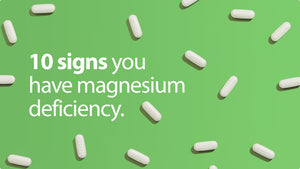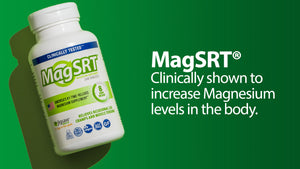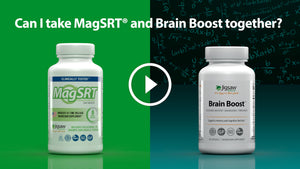By Sarah Clachar, Health Writer
August 3, 2009
Pure frustration! David Gratton loved tennis. But every good day on the courts would end with severe leg cramps by the end of the third set. His hamstrings are solid as rocks.
Gratton tried potassium and it didn't do much good. Then he started supplementing with magnesium...
"Since taking Jigsaw magnesium with slow-release Technology (SRT), I have literally eliminated the problem," says Gratton. "The cramps, which were agonizing, no longer occur."1
As Gratton and many other athletes have discovered, magnesium can make a real difference in boosting their performance and helping their bodies recover from exertion. It plays a pivotal role in over 300 enzymatic reactions, including those key for energy metabolism and healthy muscular activity.
But the truth is most athletes don't know about the benefits of this important mineral, according to Jeff Kotterman, a sports nutritionist and Director of the National Association of Sports Nutrition (NASN).2 Plenty of athletes pay homage to electrolytes but only consider sodium, potassium, and chloride in this mix. The electrolyte magnesium, the second most common element in your cells after potassium, is just as - if not more - important.
Key for Healthy Muscles and Nerves
"Magnesium is a key substance in the proper functioning of nerves and muscles," Kotterman points out. Muscles need the energy to relax. In your body, energy comes in the form of ATP. And ATP can only be made with enzymes called 'ATPases' which require magnesium to work.
And these enzymes are in high demand. Your body can only store about 3 oz. of ATP at a time. Given that during strenuous workouts your body may use as much as 15 kgs of ATP/hour, you can see how hard these enzymes work.3
Magnesium allows you to push your muscles hard: Fewer cramps to sideline you during the workout and less soreness afterward.
A Little Bit Can Make a Big Difference
Kotterman points out that just a mild deficiency in magnesium can inhibit athletic performance. This has been shown by several studies, like this one published in the Journal of Nutrition:4
"In 2002, 12 post-menopausal women spent over 6 months at the Grand Forks Human Nutrition Research Center working with scientists to document how magnesium impacts athletic performance. For the first month of the experiment, the women supplemented a basic diet with 200 mg of magnesium daily. For the following three months, they ate a low magnesium diet with no supplementation. And finally, for a month and a half at the end, they supplemented the low magnesium diet with 200 mg of magnesium.
Exercise tests were conducted at the end of each period of the study. The researchers found that the study participants used the most oxygen and their heart rate was highest during exercise when they had the lowest amount of magnesium in their diet. "
In other words, their bodies had to work that much harder and use more oxygen when there wasn't enough magnesium. With adequate magnesium, their bodies were more efficient at doing strenuous activity.
A Cardio Must
Magnesium also keeps your cardiovascular system resilient. "It helps protect the atrial lining from the stress of sudden blood pressure changes," notes Kotterman. Just like the larger muscles, magnesium helps the muscles surrounding your arteries relax, allowing your arteries to expand.
Additionally, as a cofactor in the production of elastin, it keeps your arteries flexible. Through arterial muscle relaxation and elastin, your arteries are able to adjust to the increased pressure as your body pushes more blood through them during heavy workouts.
Get It, And Get Going!
If you're not magnesium deficient, notes Kotterman, most research indicates that magnesium will not make much of a difference in performance. But since most Americans are deficient in this mineral, there's a very good chance it will make a difference for you.
Kotterman recommends you incorporate it into your regular diet as well as take it right before and right after activity as part of your hydration routine. He also noted that some evidence indicates it may increase the absorption of oral creatine monohydrate, a supplement used by many strength athletes. If you're taking creatine, he suggests you take magnesium with the creatine both before and after strength activities.
David Gratton takes 2 Jigsaw MagSRT tablets twice daily and ups the number to 3 tablets each dosage on days he plays tennis.
"I will be 66 in August and have been a fitness-oriented person all of my adult life," says Gratton. "As I get older I feel that Jigsaw Magnesium has been a real boon to me and has allowed me to continue to be as active as I am."5
So join him and keep up the pace! If cramps are getting in your way or you would like to turn your performance up a notch, incorporate more magnesium into your daily routine. It may be the essential element your workout is missing.
Jigsaw MagSRT® is an easy and effective way to get the magnesium your body needs!
Cited Sources
- Gratton, David. Personal Interview 7.02.09
- Kotterman, Jeff. Personal Interview 7.01.09
- Hamilton, Andrew. "Magnesium: Why Magnesium Matters to Athletes"; viewed at http://www.bodybuilding.com/fun/peak32.htm on 7.02.09
- Lukaski, Henry et al. "Dietary Magnesium Depletion Affects Metabolic Responses during Submaximal Exercises in Postmenopausal Women." 2002 The American Society for Nutritional Sciences J. Nutr. 132:930-935, 2002
- Gratton, David. Personal Interview 7.02.09




















